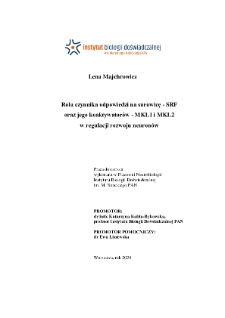- Search in all Repository
- Literature and maps
- Archeology
- Mills database
- Natural sciences
Advanced search
Advanced search
Advanced search
Advanced search
Advanced search

Object
Title: Rola czynnika odpowiedzi na surowicę – SRF oraz jego koaktywatorów – MKL1 i MKL2 w regulacji rozwoju neuronów : praca doktorska
Institutional creator:
Instytut Biologii Doświadczalnej im. Marcelego Nenckiego PAN
Contributor:
Kalita-Bykowska, Katarzyna (1974– ) : Supervisor ; Liszewska, Ewa : Auxiliary supervisor
Publisher:
Instytut Biologii Doświadczalnej im. Marcelego Nenckiego PAN
Place of publishing:
Description:
142 pages : illustrations ; 30 cm ; Bibliography ; Summary in English
Degree name:
Degree discipline :
Degree grantor:
Nencki Institute of Experimental Biology PAS ; degree obtained: 28.06.2024
Type of object:
Abstract:
Serum Response Factor (SRF) is a key transcription factor that regulates gene expression in the adult brain in response to neuronal stimulation. Recent findings reveal the role of SRF and MKL in prenatal neuronal cell development. Despite this knowledge, the role of SRF and MKL in postnatal neuronal development remains poorly understood. Studies indicate a link between single nucleotide changes (SNP) in MKL1/2 an elevated risk of neurodevelopmental diseases associated with abnormalities in the process of neuronal maturation. The influence of SRF and MKL on development of dendritic trees and spines in neurons is still poorly studied. The results presented in this thesis show that deletion of the SRF during early postnatal development in vitro decreases the number and total length of dendrites and reduces dendritic tree complexity. Neurons lacking SRF also exhibit a lower density of dendritic spines and an increased number of immature spines. Additionally, the study investigated the influence of SNP in MKL, identified in humans, on their protein function in neurons in vitro. The subcellular localization of the proteins, their ability to activate transcription, and their effect on dendritic tree maturation were analyzed. Results demonstrate that overexpression of MKLs, influenced by BDNF, alters their neuronal localization, activates SRF-dependent transcription, and increases the complexity of the dendritic tree in vitro. Moreover, we identified SNP in MKL1/2 that disrupted their function. The study was extended with the analysis of the development of human neuronal cells obtained by differentiation from induced pluripotent stem cells. Neurons arising from neural stem cells where SRF was silenced using shRNA exhibited an increase in the number of basal dendrites. In conclusion, the downregulation of the SRF and SNP in MKL contributes to abnormalities in the neuronal structure during development in vitro. These morphological changes are often observed in animal models of neurodevelopmental diseases.
Detailed Resource Type:
Resource Identifier:
Source:
Language:
Language of abstract:
Rights:
Terms of use:
Copyright-protected material. May be used within the limits of statutory user freedoms
Copyright holder:
Publication made available with the written permission of the author
Digitizing institution:
Nencki Institute of Experimental Biology of the Polish Academy of Sciences
Original in:
Library of the Nencki Institute of Experimental Biology PAS
Access:
Object collections:
- Digital Repository of Scientific Institutes > Partners' collections > Nencki Institute of Experimental Biology PAS
- Digital Repository of Scientific Institutes > Partners' collections > Nencki Institute of Experimental Biology PAS > Dissertations
- Digital Repository of Scientific Institutes > Partners' collections > Nencki Institute of Experimental Biology PAS > Dissertations > PhD Thesis
- Digital Repository of Scientific Institutes > Literature
- Digital Repository of Scientific Institutes > Literature > Thesis
Last modified:
Dec 16, 2024
In our library since:
Jun 24, 2024
Number of object content downloads / hits:
49
All available object's versions:
https://rcin.org.pl./publication/277849

 INSTYTUT ARCHEOLOGII I ETNOLOGII POLSKIEJ AKADEMII NAUK
INSTYTUT ARCHEOLOGII I ETNOLOGII POLSKIEJ AKADEMII NAUK
 INSTYTUT BADAŃ LITERACKICH POLSKIEJ AKADEMII NAUK
INSTYTUT BADAŃ LITERACKICH POLSKIEJ AKADEMII NAUK
 INSTYTUT BADAWCZY LEŚNICTWA
INSTYTUT BADAWCZY LEŚNICTWA
 INSTYTUT BIOLOGII DOŚWIADCZALNEJ IM. MARCELEGO NENCKIEGO POLSKIEJ AKADEMII NAUK
INSTYTUT BIOLOGII DOŚWIADCZALNEJ IM. MARCELEGO NENCKIEGO POLSKIEJ AKADEMII NAUK
 INSTYTUT BIOLOGII SSAKÓW POLSKIEJ AKADEMII NAUK
INSTYTUT BIOLOGII SSAKÓW POLSKIEJ AKADEMII NAUK
 INSTYTUT CHEMII FIZYCZNEJ PAN
INSTYTUT CHEMII FIZYCZNEJ PAN
 INSTYTUT CHEMII ORGANICZNEJ PAN
INSTYTUT CHEMII ORGANICZNEJ PAN
 INSTYTUT FILOZOFII I SOCJOLOGII PAN
INSTYTUT FILOZOFII I SOCJOLOGII PAN
 INSTYTUT GEOGRAFII I PRZESTRZENNEGO ZAGOSPODAROWANIA PAN
INSTYTUT GEOGRAFII I PRZESTRZENNEGO ZAGOSPODAROWANIA PAN
 INSTYTUT HISTORII im. TADEUSZA MANTEUFFLA POLSKIEJ AKADEMII NAUK
INSTYTUT HISTORII im. TADEUSZA MANTEUFFLA POLSKIEJ AKADEMII NAUK
 INSTYTUT JĘZYKA POLSKIEGO POLSKIEJ AKADEMII NAUK
INSTYTUT JĘZYKA POLSKIEGO POLSKIEJ AKADEMII NAUK
 INSTYTUT MATEMATYCZNY PAN
INSTYTUT MATEMATYCZNY PAN
 INSTYTUT MEDYCYNY DOŚWIADCZALNEJ I KLINICZNEJ IM.MIROSŁAWA MOSSAKOWSKIEGO POLSKIEJ AKADEMII NAUK
INSTYTUT MEDYCYNY DOŚWIADCZALNEJ I KLINICZNEJ IM.MIROSŁAWA MOSSAKOWSKIEGO POLSKIEJ AKADEMII NAUK
 INSTYTUT PODSTAWOWYCH PROBLEMÓW TECHNIKI PAN
INSTYTUT PODSTAWOWYCH PROBLEMÓW TECHNIKI PAN
 INSTYTUT SLAWISTYKI PAN
INSTYTUT SLAWISTYKI PAN
 SIEĆ BADAWCZA ŁUKASIEWICZ - INSTYTUT TECHNOLOGII MATERIAŁÓW ELEKTRONICZNYCH
SIEĆ BADAWCZA ŁUKASIEWICZ - INSTYTUT TECHNOLOGII MATERIAŁÓW ELEKTRONICZNYCH
 MUZEUM I INSTYTUT ZOOLOGII POLSKIEJ AKADEMII NAUK
MUZEUM I INSTYTUT ZOOLOGII POLSKIEJ AKADEMII NAUK
 INSTYTUT BADAŃ SYSTEMOWYCH PAN
INSTYTUT BADAŃ SYSTEMOWYCH PAN
 INSTYTUT BOTANIKI IM. WŁADYSŁAWA SZAFERA POLSKIEJ AKADEMII NAUK
INSTYTUT BOTANIKI IM. WŁADYSŁAWA SZAFERA POLSKIEJ AKADEMII NAUK




































